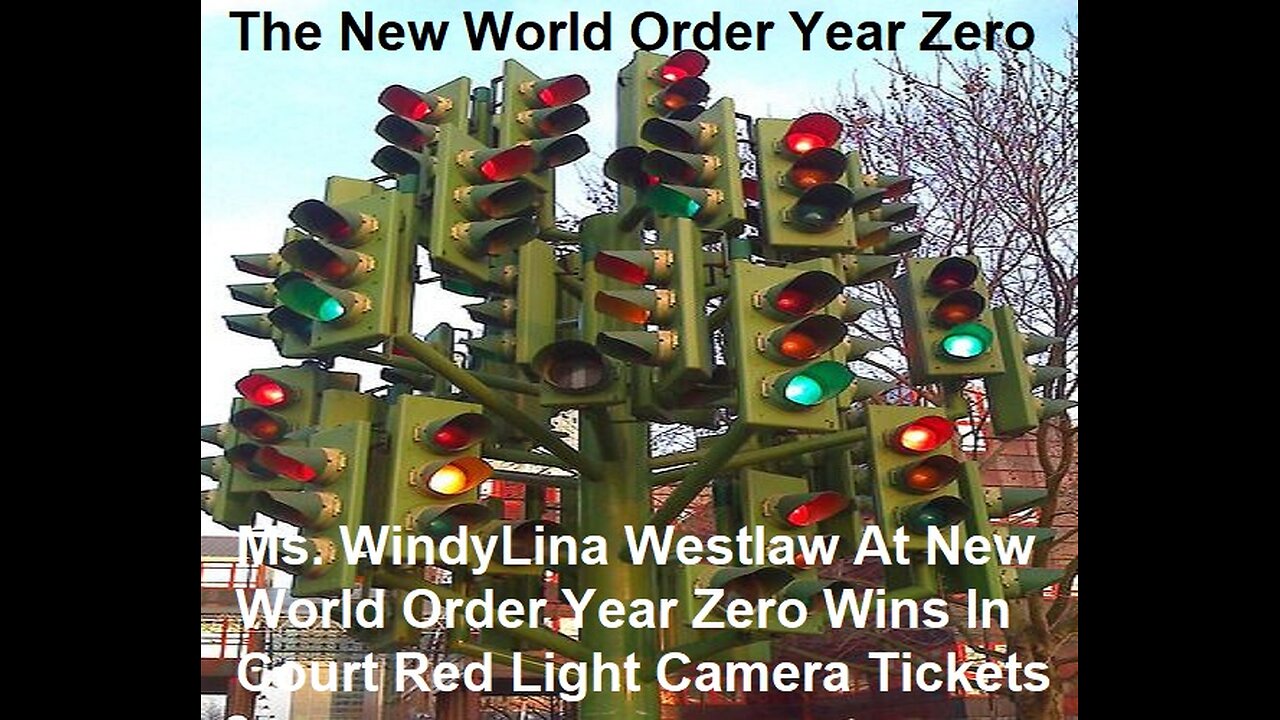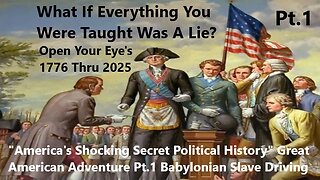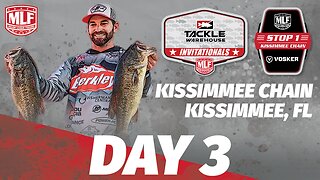Premium Only Content

Ms. WindyLina Westlaw At New World Order Year Zero Wins Red Light Camera Tickets
This Is A Real Court Hearing Of Ms. WindyLina Westlaw - Updated Today Nov. 16 2023 Judge Ruled Today at 14:12 or 2:12 PM - We Win This Court Case and All Charges In Case Are Now Drop and Case Is Dismissed In Full Today ! Great Job To The New World Order Year Zero.
Pro-Se At New World Order Year Zero Up Coming Trial at Spokane, WA. Hearing Rm. D at 13:30 or 1:30 PM.
Infraction # 0972300299989 Pin # 7396 Version #: 1
https://www.violationinfo.com/NewHome.aspx? - Filed This Day Nov. 13 2023 - In Spokane, WA. U.S.A.
A Red Light Camera Ticket Photo Of 0.2 Tens A Second
In Municipal Court - Red Light Tickets Wa.& Az.
Of And In The City of Spokane, Washington
In The County Of Spokane, Wash. U.S.A.
Municipal Court Clerk's Office
1100 W Mallon Ave Spokane, WA 99260 U.S.A.
City of Spokane – Municipal Court - Red Light Tickets
3rd Party Photo Enforcement Program P.O. Box 27748 Tempe, AZ 85285
Plaintiff/ Respondent
Vs.
1st Party - New World Order Year Zero
2nd Party - You Can Not Issues A Tickets To Objects Car/ Gun
3rd Party - 2022 Hyundai Venue – Car - Lic. # 9B6XX76 WindyLina
So New World Order Year Zero Is Entering A Plea Of Not Guilty and City of spokane need to prove factual allegations for its charge that are necessary by law to prove each of the elements of the offence running a yellow light by a object or car or gun by Unknown person.
So Not Guilty Unknown Person Example # One... We go to a party and head lady at the party take all the car keys away from everyone who is drinking or not drinking and places all the keys in a old punch bowl at the party... later someone need a car to drive to get more ice for the party... so someone drive are car to the store and buy ice and drive car back to the party and places keys back into the punch bowl and start drinking again or not drinking at all.... so someone drive (a object or car) at the party and so we did not know the car is gone or object is missing in the first place and or drive by anyone else at the party at all... so party is over now and we drive home that it ?
So Not Guilty Unknown Person Example # Two... So The Gun is at are home under the pillow at 7:00 am and I go to work at 8:00am... but now are gun is at a bank hold-up... at 12 noon and the safety cameras at the bank see a black man who is bank robbery carried out by gun point o.k. Its not about race. So black or white or yellow man etc. robbery of the bank and the safety cameras see the gun serial and name or make and send us a ticket for bank robbery and have to go to court again ? Later the police find out are maid give our gun to her boy friend who robbery the bank and later boy friends bring the gun back to the maid... our maid places gun back under our pillow... So again we did not know the gun is missing in the first place... So not guilt by reasonable doubt ?
So is it Extortion Vs. Coercion Laws ?
This The Question The Court Must Answer ?
This Information above in letter mail to the object or car dated Oct. 11 2023 Municipal Court Clerk's Office 1100 W Mallon Ave Spokane, WA 99260
Per U.S.A. Laws Everyone Is Criminal Red Light Camera You Can't Write Ticket To A Object Etc.
Per U.S.A. Government DOA-DOJ-FBI-CIA-Etc. Everyone In U.S.A. All Person And Or America Citizens Right Now Today Is A Criminal As of Oct 2023 Need To Be In Jail Or Pay $$$ Fines Now. Per all federal and local police and all government agencies. All The America People Break The Law's Average 3 Times Everyday with A Average Fine of $512 dollars a day. it add up to $512 x 365 days in a year add up to $186,880 Dollars per year in fines per every person alive today right now. also federal and local agencies issue an average of 27 rules for every law over the past decade.
However, the rules issued in a given year are typically not substantively related to the current year’s laws, as agency output represents ongoing implementation of earlier legislation. Remember Ignorance of the law is a fundamental legal principle in the US that means that if someone breaks the law, they are still liable even if they had no knowledge of the law being broken. According to a 2020 article, the more than 300,000+ laws and regulatory crimes on the federal law books serve little purpose other than inviting arbitrary enforcement by providing prosecutors the tools to charge nearly anyone every day for your life with violating some long-forgotten regulation or law and to pay the fines now or go to jail for everyone in the U.S.A.. Government Every Man, Women, & Child Is A Criminal & Need 2 Go To Jail For Life.
A cell phone app is a smartphone add-on that performs functions other than making a phone call, ranging from GPS map to games to medical monitoring and speeding in your car.
So per GPS mapping every street and speed limits of all roads in all town and roads every place of earth we can see you every move and every person driving or moving around town by car or truck... so if you drive 30 mile per hour in a 25 miles per hour zone you get a ticket for speeding etc. your cell phone will tell your speed everyday and night too. most people will get 3-5 tickets a day. you are your brothers keeper and every cell phone in car will get a ticket for speeding and you pay your fine or go to jail.
So Per U.S.A. Government Every Man, Women, & Child Confiscation of all property and all assets you have to pay all tickets and all fines every day of your life. P.S. Remember All The America People Break The Law's Average 3 Times Everyday with A Average Fine of $512 dollars a day.
The phrase not guilt by "beyond a reasonable doubt" means that the evidence presented and the arguments put forward by the prosecution establish the defendant's guilt so clearly that they must be accepted as fact by any rational person. If the jury cannot say with certainty based on the evidence presented that the defendant is guilty, then there is reasonable doubt and they are obligated to return a non-guilty verdict. So If Not Guilt by Reasonable Doubt is insufficient evidence that prevents a judge or jury from convicting a defendant of a crime. This person should not be convicted and set free if in jail by the court now. ?
Red Light Camera Fact Sheet With properly posted speed limits and properly installed and timed traffic-control devices, there is no need for ticket cameras. They can actually make our roads less safe.
1) Ticket cameras do not improve safety Despite the claims of companies that sell ticket cameras and provide related services, there is no independent verification that photo enforcement devices improve highway safety, reduce overall accidents, or improve traffic flow. Believing the claims of companies that sell photo enforcement equipment or municipalities that use this equipment is like believing any commercial produced by a company that is trying to sell you something.
2) There is no certifiable witness to the alleged offense A picture may be worth a thousand words, but it may also take a thousand words to explain what the picture really means. Even in those rare instances where a law enforcement officer is overseeing a ticket camera, it is highly unlikely that the officer would recall the supposed violation. For all practical purposes, there is no “accuser” for motorists to confront, which is a constitutional right. There is no one who can personally testify to the circumstances of the alleged violation, and just because a camera unit was operating when it was set up does not mean it was operating properly when the picture was taken of any given vehicle.
3) Ticketed recipients are not adequately notified Most governments using ticket cameras send out tickets via first class mail. There is no guarantee that the accused motorist will even receive the ticket, let alone understand it and know how to respond. However, the government makes the assumption that the ticket was received. If motorists fail to pay, it is assumed that they did so on purpose, and a warrant may be issued for their arrest.
4) The driver of the vehicle is not positively identified Typically, the photos taken by these cameras do not identify the driver of the offending vehicle. The owner of the vehicle is mailed the ticket, even if the owner was not driving the vehicle and may not know who was driving at the time. The owner of the vehicle is then forced to prove his or her innocence, often by identifying the actual driver who may be a family member, friend, or employee.
5) Ticket recipients are not notified quickly People may not receive citations until days or sometimes weeks after the alleged violation. This makes it very difficult to defend oneself because it would be hard to remember the circumstances surrounding the supposed violation. There may have been a reason that someone would be speeding or in an intersection after the light turned red. Even if the photo was taken in error, it may be very hard to recall the day in question.
6) These devices discourage the synchronization of traffic lights When red-light cameras are used to make money for local governments, those governments are unlikely to jeopardize this income source. This includes traffic light synchronization, which is the elimination of unneeded lights and partial deactivation of other traffic lights during periods of low traffic. When properly done, traffic light synchronization decreases congestion, pollution, and fuel consumption.
7) Cameras do not prevent most intersection accidents Intersection accidents are just that, accidents. Motorists do not casually drive through red lights. More likely, they do not see a given traffic light because they are distracted, impaired, or unfamiliar with their surroundings. Even the most flagrant of red-light violators will not drive blithely into a crowded intersection, against the light. Putting cameras on poles and taking pictures will not stop these kinds of accidents.
8) There are better alternatives to cameras If intersection controls are properly engineered, installed and operated, there will be very few red-light violations. From the motorist’s perspective, government funds should be used on improving intersections, not on ticket cameras. Even in instances where cameras were shown to decrease certain types of accidents, they increased other accidents. Simple intersection and signal improvements can have lasting positive effects, without negative consequences. Cities can choose to make intersections safer with sound traffic engineering or make money with ticket cameras. Unfortunately, many pick money over safety.
9) Ticket camera systems are designed to inconvenience motorists Under the guise of protecting motorist privacy, the court or private contractor that sends out the tickets often refuses to include a copy of the photo to the accused vehicle owner. This is really because many of the photos do not clearly depict the driver or the driver is obviously not the vehicle owner. Typically, the vehicle owner is forced to travel to a courthouse or municipal building to even see the photograph, an obvious and deliberate inconvenience meant to discourage ticket challenges.
10) Taking dangerous drivers’ pictures doesn’t stop them Ticket cameras do not apprehend seriously impaired, reckless, or otherwise dangerous drivers, or get them off of the road.
In the US, the spousal privilege precludes one spouse from testifying against the other spouse in criminal or related proceedings, and either spouse can invoke the privilege to prevent the testimony. This privilege does not survive the dissolution of the marital relationship. Spousal immunity is a long-standing rule that says an individual cannot be forced to testify against their spouse in a criminal case. And two other rules protect couples from possibly incriminating each other. Confidential Communication Privilege and Privilege Not to Testify in a Criminal Case.
Motion
UNCONSTITUTIONAL DENIAL OF RIGHT TO CONFRONT AND CROSS EXAMINE ADVERSARIAL WITNESSES
As written, the Code of the City of Spokane § 16A.64 is unconstitutional for a number or reasons including but not limited to the fact that it denies the Defendant due process constitutional rights under the 5th and 6th Amendments to Federal Constitution as incorporated through the 14th Amendment to the Federal Constitution, and it violates his State Constitutional rights under the Washington State Constitution
The 6th Amendment to the United States Constitution as incorporated through the 14th Amendment to the Constitution states that “in all criminal prosecutions, the accused shall enjoy the right to . . .be confronted with the witnesses against him . . .” Additionally, the Washington State Supreme Court has held of the Washington State Constitution “guarantees to the defendant in criminal cases the right to cross-examination of the adversary’s witnesses. These rights include the right to reasonable cross examination of these witnesses. However, in this particular prosecution, the Code does not call for nor can the City of Spokane produce any human witness that could be subject to cross examination, which can testify to actual first hand information evidencing that the alleged offense even occurred, other than the Defendant himself. Instead, the City is relying on hearsay evidence, i.e. unclear pictures which do not even show anyone driving the vehicle in question taken out of court and used to prove the matter asserted. Pictures in which one cannot even identify the sex, race or identifying characteristics of the driver, or in this particular situation, pictures in which one cannot even identify the existence of a driver in the vehicle at all.
Use of Obviously Altered/Manipulated Evidence
The photos are further suspect in that the infraction notices contain obviously altered and blacked out portions of photographs, showing that the photographs were obviously manipulated after being created by a remotely operated, inanimate machine. The pictures also have images of a “scoreboard-like box” superimposed upon them. As such, the pictures presented do not accurately and fairly represent the intersection in question in that they contain an image of an object which does not actually appear over the intersection in reality.
The fact is the City has no human being that can properly testify to first hand knowledge of the incident in question or the accuracy of, and the foundation for the photo(s) intended as prima facie evidence, nor is this a situation in which there was a traffic officer who contemporaneously observed the offense in question. In that the alleged evidence was produced by mechanical camera, which is triggered remotely by non-human means, gathered after the fact, and developed and processed by a third party contractor that did not actually witness the incident in question. The third party in this instant case is a civilian contractor who operates the cameras for profit, i.e., a company that has a vested economic interest in the outcome of the production of evidence which leads to citations and convictions. Quite literally, the party producing the alleged incriminating evidence of the alleged violations enjoys a direct economic gain with each citation manufactured. This creates a suspect situation, rank with potential bias and the potential appearance of improprieties.
Lack Of Foundation For The Entry Of The Photos Into Evidence
The law in Washington State holds that “the party offering the photographs must demonstrate its relevance and lay a foundation for their introduction in evidence.” Normally, a foundation and authentication for a photograph is established by the photographer who took the photo or a witness with first hand information that can testify that the photo purports to accurately portray what was actually observed first hand on the date and time in question. In this case, because a photograph was produced by remote, mechanical means, there is no one with first hand information who is capable of testifying to the foundation and accuracy of the photo purporting to accurately portray what could have been observed on the time and date in question. We recognize that while there is some case law which indicates that “even though no human is capable of swearing that he personally perceived what a photograph purposes to portray . . .there may nevertheless be good warrant for receiving the photograph in evidence.” However, in such cases, the test of admissibility is “whether the evidence is sufficient to provide an adequate foundation assuring the accuracy of the process producing it.” This is important, for not all mechanical means of producing evidence are deemed sufficiently scientifically reliable to warrant admission into evidence. The prime example being results from a polygraph– which is a mechanical / scientific method of producing evidence of guilt, but is not deemed scientifically reliable enough to warrant acceptance into evidence.
Lack Of Established Scientific Reliability And Acceptance Of Mechanical Device Used To Create Evidence
Likewise, the remote red-light photographic equipment used in this case is a mechanical / scientific method of producing evidence which lacks the scientific reliability, scientific acceptance, and reliability records to warrant its unquestionable acceptance into evidence, in that these machines are without sufficient documentation evidencing its scientific reliability, or their routine calibration and testing. The U.S. Supreme Court in Daubert v. Merrell Dow Pharmaceuticals, Inc., 509 U.S. 579, (1993) reasoned that when faced with a proffer of scientific evidence, the court must make a preliminary assessment of whether the evidence’s underlying reasoning and methodology is scientifically valid and whether it can be properly applied to the facts at issue. Among the many considerations the Court indicated should bear in the inquiry, were whether the theory or technique in question can be tested, whether it has been the subject to peer review and publication, its known or potential error rate, the existence and maintenance of standards controlling its operation, and whether it has attracted widespread acceptance within the scientific community. The photo enforcement red light camera system is a machine which is without sufficient documentation evidencing its acceptance as a reliable and well recognized method of testing, and is a machine and process which is without sufficient documentation evidencing its accuracy and/or potential error rate. It is a machine which is without sufficient documentation evidencing a reliable chain of custody for the alleged pictures which serve as the prima facie evidence. There is no documentation evidencing the machine which is operated by sensors and electronic type technology (some of which is buried under ground) is routinely and scientifically calibrated, tested and maintained to insure accuracy, calibration or proper placement of the equipment, and/or the meters and sensors used. Nor is there any evidence to prove that the machine was properly calibrated and working in perfect order at the exact date and exact time in question. The calibration and accuracy of these machines are questionable in that it is an established fact that the cameras are frequently jostled, tinkered with, and routinely moved about the City. The Spokane City’s indicates that sometimes after repairs “the photo red light cameras are rotated and up dated from time to time among intersection locations.” In light of the fact that no two intersections are the same, the machines would require specific re-adjustments with each and every move. Yet the City of Spokane claims in response to a Freedom of Information Act request that they do not maintain any records of calibration. Thus, to allow the use of such evidence without proof of its calibration and accuracy would clash with the fundamental due process rights of the accused. The fundamental unfairness of utilizing remote photo evidence is not only 1984 Orwellian in nature, but is unconstitutional.
Unconstitutional Infringement On The Fifth Amendment Rights Of The Accused
City of Spokane Code § 16A.64 is further unconstitutional in that it denies the Defendant his constitutional rights under the Fifth Amendment to the U.S. Constitution as incorporated through the 14th Amendment to the Constitution and under the Washington State Constitution, in that it compels the Defendant to give up his Constitutional right and privilege against self incrimination in order to take affirmative actions to rebut the presumption created by the code section.
It is fundamental constitutional hornbook law that in America a Defendant is innocent until proven guilty beyond a reasonable doubt. The Fifth Amendment to the U.S. Constitution as incorporated through the 14th Amendment to the Constitution further holds a defendant is entitled to due process, including but not limited to the fact he or she cannot be compelled in any criminal case to be a witness against himself. Specifically, the U.S. Supreme Court inLefkowitz v. Turley, 414 U.S. 70, 77 (1973) stated “[t]he Amendment not only protects the individual against being involuntarily called as a witness against himself in a criminal prosecution but also privileges him not to answer official questions put to him in any other proceeding, civil or criminal, formal or informal, where the answers might incriminate him in future criminal proceedings.“(Emphasis added.) Also see McCarthy v. Arndstein, 266 U.S. 34, 40 (1924) (the privilege is not ordinarily dependent upon the nature of the proceeding in which the testimony is sought or is to be used. It applies alike to civil and criminal proceedings . . .)
Likewise, similar protections can be found in the Washington State Constitution. Specifically, Washington State Constitution, states a defendant cannot “. . .be compelled in any criminal proceeding to give evidence against himself . . . .” Washington State Constitution, has been interpreted to mean “the privilege against self-incrimination protects a person from any disclosure sought by legal process against him as a witness.” Washington State Constitution, has been held to further preclude the prosecution from using an assertion of the privilege against self-incrimination to discredit or convict the person who asserted it. However, that is the exact situation the application of City of Spokane Code Section § 16A.64 creates. (I.e., in that the only way under the ordinance to rebut the presumption of guilt is to forfeit the constitutional right to remain silent and to take affirmative action to prepare an affidavit denying involvement, appearing to testify in open court, or indicating the vehicle was stolen.) Thus, under the Spokane Code, one is not innocent until proven guilty. One must take affirmative steps and forfeit the right to remain silent in order to present three, and only three, very specific and enumerated defenses. Case law holds that “it is the question, not the anticipated answer, that is relevant to a ruling on the privilege against self-incrimination.”
Unconstitutional And Improper Limitation Of Defenses
The unconstitutionality of remote photo enforcement is further highlighted by the fact the statute specifically limits defenses to three ways, and only three ways, in which a defendant may attack liability and rebut the presumption under the statute. These limitations foreclose and prevent the basic fundamental ability to assert other viable, rational, and well- reasoned defenses such as breach in chain of custody; altered evidence; improperly calibrated machines; broken sensors; necessity; yielding the right of way to an emergency vehicle; being part of a funeral procession; being directed through the intersection by the Police; presenting alibi evidence through a third party witness, etc. As written, Spokane Code, § 16A.64 does not allow for the presentation of any other defenses, no matter how legitimate, to rebut the presumption. The fact that the ordinance creates a presumption and then in the next breath expressly limit the ability to rebut the presumption, throws the concept of innocent until proven guilty on its ear and establishes a fundamentally unfair scheme that creates the appearance of improprieties and an inequitable rubber stamp court system stacked against the Defendant. In fact, other Courts have held that restricting an accused to a single method of rebutting the prima facie case against him would deprive him of due process of law. See People v. Hoogy, 277 Mich. 578, 267 N.W. 605 (1936). The Court in People v. Hoogy held:
If the accused submits himself as a witness the prima facie case made by the ordinance is overcome, but otherwise (regardless of whatever other testimony than that of the accused is submitted) the prima facie case against him is not overcome. The italicized portion of the ordinance restricts the accused to one class of competent testimony by which the presumption may be met in making his defense, and in so doing bars him from meeting the presumption with other testimony regardless of its competency and probative force. Such an ordinance provision deprives the accused of due process, compels him to be a witness in proceedings where he is being prosecuted and is therefore obviously invalid and violative of the Constitution . . .Hoogy, at p. 606-607 (Emphasis added)
Under a strict reading of the Code, even if you proved the light was malfunctioning; that necessity required you to go through the light; that a Police Officer not seen in the picture waived you through the intersection; that you were in a funeral procession; that the evidence was altered; that the machine was not properly calibrated; or that a third party can provide you an alibi — there is no ability to raise those defenses or any other legitimate defense, in that those defense are not valid defenses under the code, as written– regardless of their legitimacy and probative force. The ordinance thus appears to compel all but a small minority of defendants–those whose cars were stolen prior to the offense–to testify on their own behalf in order to rebut the presumption against them. So the issue now becomes whether these apparent limits on the defendant’s ability to rebut the presumption against him render the ordinance unconstitutional for self-incrimination reasons. The Virginia Court of Appeals has addressed this specific issue. In Speller v. Commonwealth, 2 Va. App. 437, 441, 345 S.E.2d 542 (1986) the court, citing Griffin v. California, 380 U.S. 609 (1965), held that a lower court ruling, “that [the defendant] could not substitute another person to testify as to matters on which he himself could testify,” was erroneous. The court said that the ruling in question impermissibly burdened the constitutional privilege against self-incrimination by penalizing the defendant for exercising his right to refuse to take the stand. Specifically, the Court in Speller stated:
The court’s ruling that Speller could not substitute another person to testify as to matters on which he himself could testify is erroneous. The effect of the trial court’s ruling was to preclude relevant, admissible evidence on behalf of Speller because he did not choose to take the witness stand and offer the evidence personally. By handicapping Speller’s defense in this manner, the court achieved the impermissible result of imposing a penalty on him for exercising his constitutional privilege. Speller, at page 442.
Unconstitutional/Improper Conclusive Presumption And Unconstitutional/Improper Shifting Of The Burden Of Proof
An additional infirmity of the Ordinance can be found in the fact that Spokane City Code, §16A.64, unconstitutionally removes and relieves the obligation of the spokane city's to prove beyond a reasonable doubt the defendant’s guilt and further improperly and unfairly limits a Defendant’s defenses, unless he forfeit his constitutional right and privilege against self incrimination. Thus, as written in order to rebut the presumption of guilty, one must forfeit both his Federal and State Constitutional Rights to stand mute and takes affirmative steps to provide written or oral statements in the burden of proving his innocence. This same infirmity also creates an impermissible and unconstitutional burden shifting situation. The U.S. Supreme Court has dealt with the burden shifting presumption issue on numerous occasions. In Sandstrom v. State of Montana, 442 U.S. 510 (1979), the Court held presumptions which impermissibly shift the burden of persuasion to the Defendant, via either a conclusive presumption or a burden shifting presumption are unconstitutional. In fact, the U.S. Supreme Court in Sandstrom held “a conclusive presumption in this case would conflict with the overriding presumption of innocence which the law endows the accused and which extends to every element of the crime.”Sandstrom, Supra at p. 522., see also Morissette v. United States, 342 U.S. 246 (1952),Mullaney v. Wilber, 421 U.S. 684 (1975), United States v. United States Gypsum Co., 438 U.S. 422 (1978). The U.S. Supreme Court in Sandstrom, 442 U. S. 510, 534 (1979) went on to state that “a presumption which, although not conclusive, had the effect of shifting the burden of persuasion to the defendant, would suffer from similar infirmities.” On this same line of logic, the City of Spokane, Ordinance, § 16A.64 which creates a “rebuttable presumption” based upon simple and legal ownership and which sets forth only a few specific requirements that one must take affirmative action via testifying in open court or by filing an affidavit to rebut that presumption, creates the very same unconstitutional burden shifting situation the U.S. Supreme Court addressed and ruled unconstitutional in the above cited case.
The City’s desire to raise revenue or arguably to provide for the traffic safety of its citizens (however admirable) should not and does not trump or negate the City’s obligation to insure for and to provide for the well established, and extremely important, fundamental Constitutional and Due Process Rights of the citizens of the United States and of the Washington State. The City of Spokane will likely argue the Cameras are for the purpose of crime control, or law enforcement–not to create a Stalinist Police State. However, I would remind the Court that Stalin did not promise a Stalinist Police state either. Stalin promised crime prevention, law enforcement and a worker’s paradise. Progress in the field of law enforcement still must be tempered with constitutional safeguards.
Civil Vs. Criminal Classification
The City of Spokane is likely to argue that because they classify these tickets as “civil in nature” or “administrative” the constitutional protections afforded criminal defendants don’t apply. However, the argument is without factual and legal merit. The U.S. Supreme Court has ruled that simply classifying a fine as a civil fine is not the standard for determining if a fine is civil or penal in nature. The U.S. Supreme Court in United States v. Halper, 490 U.S. 435, 447 (1989) citing Hicks v. Feiock, 485 U.S. 624, 631 (1988) held “the labels affixed whether to the proceeding or to the relief imposed . . .are not controlling and will not be allowed to defeat the applicable protections of federal constitutional law.” (Emphasis added) The Court stated “in determining whether a particular civil sanction constitutes criminal punishment, it is the purposes actually served by the sanction in question, not the underlying nature of the proceedings giving rise to the sanction, that must be evaluated.” United States v. Halper, 490 U.S. 435, 447 (1989). The U.S. Supreme Court went on to state “we have recognized in other contexts that punishment serves the twin aims of retribution and deterrence.” See e.g. Kennedy v. Mendoza-Martinez, 372 U.S. 144, 168 (1963) (these are the “traditional aims of punishment”). Furthermore, “retribution and deterrence are not legitimate non-punitive governmental objectives.” Bell v. Wolfish, 441 U.S. 520, 539, n. 20 (1979). “From these premises, it follows that a civil sanction that cannot fairly be said solely to serve a remedial purpose, but rather can only be explained as also serving either retributive or deterrent purposes, is punishment, as we have come to understand the term.” United States v. Halper, 490 U.S. 435, 448 (1989). In this case, there is no rational relation to the necessary goal of compensating the City of Spokane for its loss associated with alleged yellow and red light runners, thus leading but to one conclusion that the fine’s purpose is to punish and deter red light running, a function that is clearly and unequivocally criminal and punitive in nature. This “civil vs. criminal” analysis and standard has been followed.
Improper Certification Of Evidence
City of Spokane Code, § 16A.64 is further infirm in that it allows for a certificate or a facsimile thereof, sworn to or affirmed by a technician employed by the city, based upon inspection of photographs, microphotographs, videotapes or other recorded images produced by the system, to come into evidence as prima facie evidence of facts contained therein without providing adequate due process protections. Under Spokane City Code, §16A.64, the certificate is allowed into evidence as prima facie evidence despite the fact that the technician has absolutely no first hand personal knowledge of the exact event to which he (or she) is certifying as fact, in that the evidence (the alleged photographs) were gather remotely, by a machine, and processed by one or more third parties after the fact. The technician is relying on obvious hearsay information given to him by a third party(s), in that the technician has no first hand knowledge of who the registered owner of a particular vehicle is or even what specific type, make, or model of vehicle was involved. In this case the technician is not certifying his personal observations, nor is he certifying records he maintains. It is important to note that under this Code Section the technician or police officer is not certifying to the validity of test results physically observed by him, or recorded contemporaneously with his observations, or even performed in his presence such as a Certificate of Drug Analysis performed by the State Laboratory, but is looking at altered evidence, which lacks a secure chain of custody, and lacks a sufficiently proven indicia of scientific reliability, in order to certify facts to which he or she did not personal witness, and to records he or she does not personally maintain. In short, this ordinance allows a third party to certify facts which have no chain of custody, no scientific indicia of reliability, and of which the third party has absolutely no personal knowledge. This clearly smacks of a fundamental due process violation and puts the judicial system on a scary slippery slope toward the abolishment of legal standards of proof and foundation.
While there are other State Code sections which allow the admission of certificates into evidence as prima facie evidence, such as Spokane City Code, §16A.64, these Code sections differ in that the certificates are certified by the individual which actually performed the analysis or laboratory examination. Under Spokane City Code, §16A.64 the certifying agent has a first hand, personal knowledge of the actual facts in that the agent personally performed the testing and examination. The underlying purpose of Spokane City Code, §16A.64 certification is to avoid the need for an expert to personally appear and testify as to the facts he personally witnessed in every case, whereas the certificate under City of Spokane City Code, §16A.64 appears to be intended to circumvent the normal evidentiary rules of the Court to allow obvious hearsay and double hearsay evidence to be made prima facie evidence of the facts contained therein by having it certified by a “technician employed by the city” without the need for that technician to have any specific training, or without the need for the certifying technician to have any first hand knowledge of the event to which he or she is certifying, and without the certification being conducted contemporaneously with the procuring of the actual evidence. Under City of Spokane Code, §16A.64, an unknown technician without any specific legal training or qualifications is able to circumvent fundamental due process and established evidentiary court rules and certify hearsay facts into prima facie evidence with only a limited ability to rebut their alleged evidence, regarding facts to which the technician has no personal knowledge, with the certification at times occurring days, weeks, and months after the alleged event. Once again, the City’s desire to raise revenue should not and does not trump or negate the City’s obligation to insure for and to provide for the well established evidentiary court rules and standards and extremely important, fundamental Constitutional and Due Process Rights which protect and are the right of the citizens of the United States and the Washington State, nor should the government be able to contract those obligations away. The presumption in this case is not to prevent busy laboratory technicians from spending all of their time in court testifying to their personal observations, but is intended to allow the City to circumvent constitutional protections to aid in the convenient production of “acceptable” hearsay evidence needed to garner quick and defenseless convictions in a for profit money making scheme, run by the City in conjunction with civilian for-profit contractors.
Unconstitutional/Presumption That Is Not Rationally Connected To The Element It Seeks To Prove
City of Spokane Code § 16A.64 is further un-constitutional in that it contains a permissive presumption that is not rationally connected to the element it seeks to prove. Permissive presumptions are constitutional if there is a “rational connection” between the ultimate fact presumed and the basic fact proven. Barnes v. United States, 412 U.S. 837, 841 (1973) (citingTot v. United States, 319 U.S. 463, 467 (1943)). While the United States Supreme Court in Totv. United States, 319 U.S. 463 (1943) held that subject to the constitutional requirements of due process, Congress has the power to prescribe what evidence is to be received in the Courts of the United States. The Court in Tot also held that the test of the validity of a statutory presumption is not the comparative convenience of producing the evidence of the ultimate fact, but the existence of a rational connection between the facts proved and the facts presumed. In short, a statutory presumption cannot be sustained if there is no rational connection between the fact proved and the ultimate fact presumed, or if the inference of the one from proof of the other is arbitrary because of the lack of connection between the two in common experience. In practical terms, this means that a permissive presumption must “more likely than not” flow from the presumed basic fact. Leary v. United States, 395 U.S. 6, 36 (1973). However, when a presumption is mandatory, such as it is in this case, the prosecution, “may not rest its case entirely on a presumption unless the fact proved is sufficient to support the inference of guilt beyond a reasonable doubt.” County Ct. v. Allen, 442 U.S. 140, 167 (1979)(Emphasis added.) In other words, in a mandatory presumption case the basic fact proven must bear sufficient relationship to the elemental fact presumed to prove it beyond a reasonable doubt. In Pennsylvania v Slaybaugh, 364 A 2d 687 (PA, 1976), the Pennsylvania Supreme Court held that, “the inferred fact of operation of a motor vehicle at a specific time does not flow logically beyond a reasonable doubt from the mere established fact of ownership.” Slaybaugh at p. 690 (Emphasis added). Thus, the court invalidated the statute at issue. Id. And in a New York case, the Court of Appeals held that lower court erred, in reasoning that proof that one owned a car created a rebuttable presumption that one was its operator. New York v. Hildebrandt, 308 N.Y. 397, 126 N.E.2d 377, 378 (NY 1955) (Emphasis added). Hildebrandt was a case in which a “photo traffic camera” was used to determine that the defendant’s car had been speeding, but the state could not or did not provide evidence of the car’s driver at the time of the infraction. The lower courts held that the mere fact that the defendant owned the car was sufficient proof that he had been driving at the time of the infraction to support conviction for speeding. The appellate court held that such an inference violated the presumption of innocence and the right to proof of guilt beyond a reasonable doubt. In Hildebrandt, the New York Court of Appeals said:
We think it is going much too far to infer the driver’s identity from the fact of ownership. We all know that many a passenger car is customarily driven at various times by various persons, we know that many a person owns more than one passenger automobile, we know that some owners are not licensed operators, and we are informed that there are outstanding in the State at least one million more automobile operators’ licenses than passenger automobile registrations. From all of this it follows, we think, that it is hardly a normal or ready inference or deduction that an automobile which speeds along a highway is being driven by its owner, and no other person. Hildebrandt, at p.379 (Emphasis added)
The same logic is certainly applicable in the Washington State and in the City of Spokane. According to a United States Department of Transportation report, in the Washington State in 1999 there were an estimated 3,749,963 class C (automobile operator) motor vehicle driver licenses in force. See: Office of Highway Policy Information, Highway Statistics 1999 (1999). This is further supported by the results from a recent Freedom of Information request made to the Washington State Department of Motor Vehicles, that show that as of June, 2001 there were over 4,374,825 valid Washington State Drivers Licenses issued to persons living in Washington State and other close by state. This number includes private licenses, commercial licenses, learner’s permits and motorcycle licenses. This number does not account for the millions of additional individuals that drive on valid out of state licenses, on suspended licenses or without licenses all together. This is important, for the U.S. Supreme Court in Sandstrom v. Montana, 442 U.S. 510, 522 (1979) held “a presumption which would permit . . . an assumption which all the evidence considered together does not logically establish would give to a proven fact an artificial and fictional effect.”
We know from experience, and the Court can take judicial notice of the fact, that clearly, some of these licensed drivers do not have automobiles registered in their own names, i.e., not everyone owns a car. For example, many of us did not have our own car when we were sixteen, despite the fact we had a license to drive, additionally many of us frequently drive our spouses or familys vehicles. Thus, when these license holders do drive, they are not necessarily driving automobiles that they own. Couple this with the fact that there is no law which prohibits someone from having permission to drive a car that is not registered to them and/or that there is no requirement or law which requires a registered owner to identify individuals that may drive his or her vehicle, it illustrates that there is an extremely high probability that the registered owner may not in fact be the driver of the vehicle being cited. Based upon Washington statistics alone, the potential is that based solely on the numbers it is a 1 in 4,253,723 chance that the photographed driver was in fact the actual registered owner. The numbers get even more remote if you factor in the fact that any person licensed in the U.S. could possibly be driving a car registered to someone else. I would further note that any requirement that would require an individual to identify who was driving the vehicle would create a number of additional constitutional issues, in that such a requirement would infringe upon the constitutionally protected freedom of association, and at times force an individual to possibly bear witness against a spouse in direct contradiction of the Spousal Privilege. No matter how one analyzes the various possible permutations of the statistics, in the words of the Hildebrandt court, it is hardly a “ready inference” that the driver of an automobile is its owner. Hildebrandt, Supra at p. 379. This leads to but one logical conclusion: that an ordinance which does not require proof of who was actually committing the offense, creates the distinct possibility of literally millions of erroneous photo red light citations being issue for the traffic infractions of others. That is far from proof beyond a reasonable doubt, especially in light of the fact that individuals are normally not responsible for the criminal acts of third parties.
The Washington Constitution provides, “[t]hat no person shall be deprived of his life, liberty, or property without due process of law,” Wa. Constitution In applying this right to the issue of evidentiary presumptions, the Washington Court of Appeals has held that, “[a] ‘natural and rational evidentiary relationship’ must always exist between ‘the fact proven and the ultimate fact presumed.'” And under Washington law, “even if the inference is permissive, if the only evidence of guilt is that which gives rise to the inference, a rational relationship must exist, beyond a reasonable doubt, between the inference and the proved fact.” Morton, 408 S.E.2d at 585 (citing Allen, 442 U.S. at 166-7; West v. Wright, 931 F.2d 262, 265 (4th Cir. 1991); and Sharp, 192 S.E.2d at 219).
Improper Delegation Of Police Powers
City of Spokane Code § 16A.64 is further infirm as being against public policy as an improper delegation of police power to a for-profit commercial enterprise. Imagine the public outcry if the City of Spokane announced that from now on, Spokane City Police Officers would receive a direct commission for each and every ticket they issued. The authority and credibility of the Police would be severely and irreparably damaged, in that such a scheme would be rank with the potential for abuse, that the officers would be subject to impeachment for bias for having an economic interest in the outcome of the charges, and based upon the fact that they have a direct economic incentive to issue as many tickets as possible, regardless of their legal and factual merit, in the hopes of increasing their income. Public policy alone should not allow that sort of scheme to exist. Yet the remote photo citation systems run by civilian contractors for profit are directly analogous to police working on a commission, in that the City of Spokane has delegated the police power to enforce red light traffic violations to a for-profit commercial enterprise, the goal of which is to create a large profit from the issuance of red light tickets. This results in an entity that has a direct and unequivocal economic interest in seeing that as many tickets are issued as possible, because each ticket issued increases its bottom line.
The fear associated with delegation of governmental police powers to private entities is that the governmental power may be used and abused to further private rather than public interests, and in such a manner as to circumvent constitutional protections or to insolate the government entity from accountability or civil rights liability. In short the contractors can be hired to do the Government’s dirty work for them, in a manner that themselves would not be allowed to, without a readily available avenue for procedural safeguards or adequate redress by the citizens. One of the safety nets created by the governments retaining the exercise of police powers is that through the democratic process, aggrieved citizen can vote abusing governmental officials out of office. Whereas, citizens have no ability to directly vote commercial contractors away.
Discovery and disclosures from red light camera jurisdiction in the area illustrate these are multi-million dollar operations. (In an article titled “D.C. Aims to Catch Speeders on Camera,” the Washington Post reported on July 2, 2001 that the District of Columbia generated over 9 million dollars in fines from red light photo enforced citations last year.) With modern computers, digital pictures, graphics, scanners and photo quality printers, one can easily adjust images to eliminate the “red eye” created by a flash bulb or to change a green light to red, especially where a multi-million dollar economic interest exists to do so. The alarming issue is once again, as written City of Spokane Code § 16A.64 does not allow defendants to raise or challenge the evidence on the issue of the potential bias, thus, once again creating a clear constitutional violation. The Washington Supreme Court has held “the right of an accused to cross-examine prosecution witnesses to show bias or motivation, when not abused, is absolute.” (Emphasis added)
Spokane City and most Washington State jurisdictions with red light cameras have cleverly approached the subject of fees. They purposely set the potential fine at $145.00+, an amount significantly less than California’s $271.00 photo enforced tickets. This amount is sufficient to penalize drivers, but is typically not high enough to justify an individual taking a day off from work to contest the ticket or to justify retaining expensive legal counsel to challenge the ticket, when the costs of representation would likely grossly exceed the ticket itself. Thus, most tickets go uncontested, and the potential of improprieties goes on– capable of repetition yet evading legal review.
WHEREFORE, any and/or all of the foregoing reasons, the Three Defendant prays this Honorable Court finds City of Spokane Code § 16A.64 and RCW 46.61.050 (1) unconstitutional, striking the Code section and/or striking the evidence against the Defendant Listed Below, and dismissing the charges against the Three Defendant with prejudice.
Spokane Municipal Code 16A.64 Automated Traffic Camera Systems
Section 16A.64.200 Purpose
Section 16A.64.210 Authorized use of Automated Traffic Safety Cameras
Section 16A.64.220 Procedures of Use of Automated Traffic Safety Cameras
Section 16A.64.240 Notice and Disposition of Traffic Infractions
Section 16A.64.250 Contracting for Automated Traffic Safety Camera Equipment and Operation and Issuance and Processing of Infractions
Section 16A.64.260 Termination of Authorization for Use of Automated Traffic Safety Cameras
Section 16A.64.270 Notice of Traffic Infraction – Issuance
and RCW 46.61.050 (1) "Fail to obey traffic control device"
In Municipal Court - Red Light Tickets Wa.-Az.
Of And In The City of Spokane, Washington
In The County Of Spokane, Wash. U.S.A.
Municipal Court Clerk's Office
1100 W Mallon Ave Spokane, WA 99260 U.S.A.
Respectfully Submitted, by All Three Party Below:
1st Party New World Order Year Zero
2nd Party You Can Not Issues A Tickets To Objects Car/ Gun
3rd Party 2022 Hyundai Venue – Car - Lic. # 9B6XX76 WindyLina
Filed This Day Nov. 13 2023
CERTIFICATE OF SERVICE
I HEREBY CERTIFY that on this date a true and correct copy of the foregoing
A Motion to Dismiss in the above-entitled-captioned matter of Spokane Code § 16A.64 and RCW 46.61.050 (1) its unconstitutional, and striking the Code section and/or striking all the evidence against All 3 Defendant in this civil rights case.
Send To And Filed With Court Address Below
In Municipal Court - Red Light Tickets Wa.& Az.
Municipal Court Clerk's Office
1100 W Mallon Ave Spokane, WA 99260 U.S.A.
Dated This _13_ Day Of November - In The Year Of Our Lord 2023 A.D.
I HEREBY CERTIFY that on this date - Below a true and correct copy of the foregoing A Motion – Is Hand Delivered In Person to Municipal Court Spokane.
Respectfully Submitted, by All Three Party Below:
1st Party - New World Order Year Zero
Prof. R. P. Westlaw – Pro-Se
Signed__________________________ & Dated This___ Day Of November 2023
2nd Party - You Can Not Issues A Tickets To Objects Car/ Gun
Ms. WindyLina Westlaw - Pro-Se
Signed__________________________ & Dated This___ Day Of November 2023
3rd Party - 2022 Hyundai Venue – Car - Lic. # 9B6XX76 WindyLina
WindyLina Westlaw - Pro-Se
Signed__________________________ & Dated This___ Day Of November 2023
How To Win A Red Light Camera Ticket Real Hearing & Fifth Amendment Other Laws
Ignorance of the law is a old fundamental legal principle in the US that means that if someone breaks the law, they are still liable even if they had no knowledge of the 300,000+ law on the books being broken by you. This principle is derived from Old Roman law and ensures that everyone is not treated equally before the law and the rule of law is not maintained anymore today in U.S.A..
Defendants arguing that they did not know or misunderstood the 300,000+ law have been told that their ignorance or mistake made no difference to their liability. However, there is an exception to this rule for all police officers in the case of a traffic stop based on the officer's erroneous understanding of the law.
It is axiomatic that ignorance of the law is not an excuse. The US Supreme Court ruled Monday there is an exception to this rule: police officers. Stated in context, the exception applies to police officers in the case of a traffic stop based on the officer’s erroneous understanding of the law.
According to a 2020 article, the more than 300,000+ laws and regulatory crimes on the federal law books serve little purpose other than inviting arbitrary enforcement by providing prosecutors the tools to charge nearly anyone every day for your life with violating some long-forgotten regulation or law and to pay the fines now or go to jail for everyone in the U.S.A.. Government Every Man, Women, & Child Is A Criminal & Need 2 Go To Jail for life.
Yes Its Free Room and Board For 40 Million People ? This refers to a situation in which a person is provided with a place to live and meals on a comprehensive basis in exchange for money, labor, or other jail considerations.
You Have No 5th Amendment Rights Anymore Now? Should I Talk to Police? No, Never, Not At All, No.... Stop Talking Now That It !
The Best Answers Now To Tell The Police or Cop FBI-CIA-DOJ-ICE-Etc. Is I Do Not KNOW or I Do Not REMEMBER ANYTHING & STOP TALKING AT ALL... Thanks From The New World Order Year Zero !
Only 2% of federal criminal defendants went to trial in 2018, and most who did were found guilty.
So Say No To All Plea Bargaining Today ? So If Everyone Go To A Full Jury Trial Every Time... If All 100% Court Case's Go To A Full Jury Trial Every Time... Will The US Government Let More People Go Free ? All Person Will Get A Speed Trial In 90 Day Or Have To Let You Go By Law ?
You Have No 5th Amendment Rights... And If The Judge Ask Or Tell You... If You Do Not Answers My Question Now And Said Later... If Not... I Will Hold You In Contempt of This Court and is a legal violation committed by you a individual who disobeys a judge or disrupts the legal process in the courtroom. It is an act of disrespect or disobedience towards a court or its officers in the form of behavior that opposes or defies the authority, justice, and dignity of the court.
-
 50:46
50:46
What If Everything You Were Taught Was A Lie?
15 days agoAmerica's True Shocking Secret Political History Great American Pt.1 Babylonian Slave Driving
2.65K8 -
 1:45:00
1:45:00
RG_GerkClan
4 hours ago🔴LIVE Sunday Special - It's Time for World Domination - Civilization VII - Gerk Clan
14K6 -
 LIVE
LIVE
Major League Fishing
3 days agoLIVE Tackle Warehouse Invitationals, Stop 1, Day 3
688 watching -
 23:34
23:34
marcushouse
5 hours ago $4.48 earnedBREAKING: Starship Launch IMMINENT – But What’s This SURPRISE Flight 9 Plan?! 🚀🔥
18.5K3 -
 8:43
8:43
Film Threat
23 hours agoTHE MONKEY | Film Threat Reviews
35.6K1 -
 15:55
15:55
TSPLY
1 day agoThe Media Is Very Afraid Of FBI Director Kash Patel
23.2K24 -
 6:57
6:57
Cooking with Gruel
18 hours agoMake Cheese Great Again
19.7K11 -
 5:17
5:17
Mrgunsngear
21 hours ago $5.20 earnedPresident Trump Has Appointed A New ATF Director
27.5K24 -
 48:17
48:17
Athlete & Artist Show
8 days ago $0.48 earnedS5E1: Chucky Announces First Kid, 4 Nations Face Off, and more!
14.6K -
 38:30
38:30
hickok45
7 hours agoSunday Shoot-a-Round # 269
41.3K12